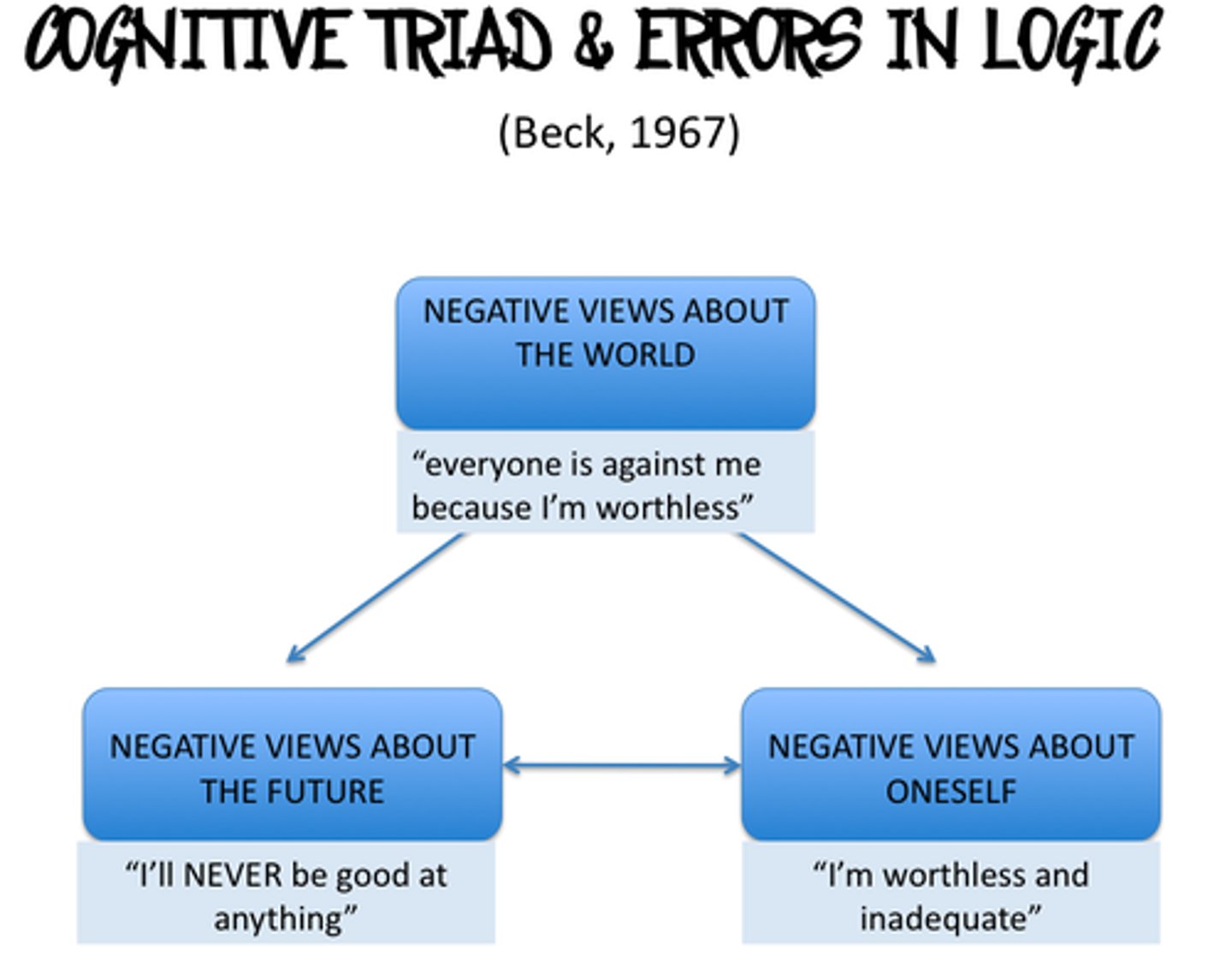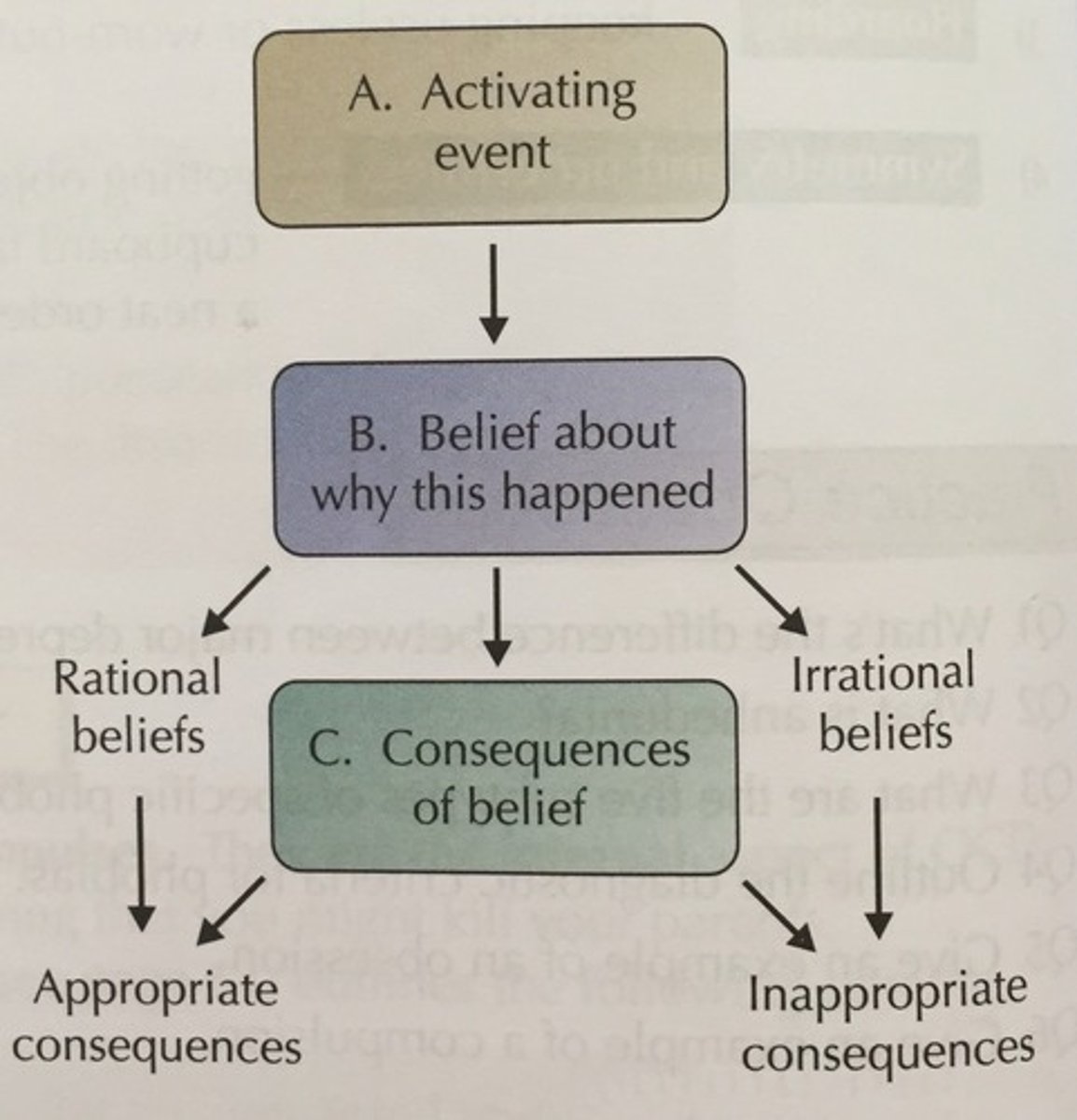psychopathology aqa
1/48
There's no tags or description
Looks like no tags are added yet.
Name | Mastery | Learn | Test | Matching | Spaced |
|---|
No study sessions yet.
49 Terms
Abnormality
A psychological or behavioural state leading to impairment and distress to others.
Deviation from ideal mental health
The failure to meet criteria of the perfect psychological well-being. This behaviour may make others feel threatened.
strength of Deviation from ideal mental health definition
It focuses on the positives rather than the negatives and focuses on what is desirable rather than what is undesirable.
Failure to function adequately
An inability to cope/perform behaviours necessary for day to day living. For example, the inability to maintain a relationship or hold down a job.
Weakness of the definition, failure to function adequately
Very subjective - There are many 'functioning' alcoholics, cocaine and heroin addicts and thus such behaviours would not meet the criteria for this definition yet 'substance dependence' is recognised as a psychological disorder.
Deviation from social norms
Behaviour which violates the accepted social norms e.g not appearing naked in public.
Weakness of deviation from social norms
It is bound by culture. Social norms are culturally relative; they are different in different cultures.
Statistical infrequency
Behaviour that is classed as abnormal if it is statistically uncommon and if the individual falls outside the 'normal distribution' they are perceived as abnormal.
Weakness of statistical infrequency
It ignores the desirability of the behaviour.
For example, sometimes a behaviour that is very rare may be very desirable, such as a very high IQ or an unusual talent for memory.
Obsessive-compulsive disorder
An anxiety disorder that has two main components: obsessions and compulsions. Obsessions are reoccurring and persistent thoughts, whereas compulsions are repetitive behaviours.
Behavioural characteristics of OCD
Centres on the compulsive behaviour.
1) compulsions are repetitive in nature so the sufferers will feel compelled to repeat a behaviour.
2) hinder everyday functioning
3) social impairment- limit the ability to form relationships
Emotional characteristics of OCD
1) obsessions are persistent and/ or forbidden thoughts and ideas, which cause levels of anxiety in OCD sufferers.
2) can also lead to depression as the anxiety can result in low mood and loss of pleasure in everyday activities.
Cognitive characteristics of OCD
1) Obsessive thoughts are the main cognitive feature of OCD e.g fear of contamination and dirt.
2) Most sufferers understand their thoughts and intrusive nature so they realise their compulsions are inappropriate
The biological approach to explaining OCD
1) Genetic explanation
Genetic explanations suggest OCD is inherited through genetic transmission. It is unlikely that single genes cause OCD, more that it is a combination of genes ( polygentic) that determines an individuals level of vulnerability to develop the disorder.
2) Neural explanation
Focus on neurotransmitters as well as brain structures.
- Neural explanations suggest that abnormal levels of neurotransmitters, in particular serotonin and dopamine are implicated in OCD.
- Also suggests that particular regions of the brain, in particular the basal ganglia and orbitfrontal cortex are involved in OCD.
Evaluation of biological explanation for OCD
A limitation is that there is strong competition from psychological explanations.
The two process model can be applied to OCD, where an association is learnt between for example dirt and anxiety, and then a link is learned between hand-washing and reducing anxiety resulting in a compulsion.
Biological approach/ treatments to OCD
Drug therapy
- Antidepressant drugs are used to treat OCD such as SSRI's ( selective serotonin re-uptake inhibitors) which elevate levels of serotonin and cause the orbital frontal cortex to function at more normal levels.
- the most common SSRI is prozac and treatment usually lasts 12-16 weeks.
-Antipsychotic drugs that have dopamine lowering effect have also proven useful in treating OCD.
Evaluation of Drug therapy as a treatment for OCD
They can cause side effects and there can be a relapse when coming off medication
Depression
Depression is a mood disorder characterised by feelings of hopelessness. Two main types:
1) unipolar
2)bipolar (manic)
positive symptoms:
- depressed mood
-lack of pleasure in activities
-loss of energy
-feelings of worthlessness
Bipolar depression
A form of depression characterised by periods of heightened moods and periods of hopelessness.
Unipolar depression
A form of depression occurring without the mania ( the mood remains at one emotional state)
Behavioural characteristics of depression
1) There can be a reduction/ loss of energy and constantly feeling tired
2) Sufferers often experience disturbances with their sleeping pattern
3) Often experience changes in appetite which causes significant weight changes
Emotional characteristics of depression
1) lack of enthusiasm
2) constant depressed mood
3)worthlessness
Cognitive characteristics of depression
1) Delusions
2) thoughts of death
3) poor memory
The cognitive approach to explaining depression
This approach focuses on people's beliefs rather than their behaviour. Depression results from systematic negative bias in thinking processes.
Becks Negative triad ( 1976)
Beck developed a cognitive explanation of depression which has three components: a) cognitive bias; b) negative self- schemas; c) the negative triad
a) Cognitive bias
Beck found that depressed people are more likely to focus on the negative aspects of a situation, while ignoring the positives. They are prone to distorting and misinterpreting information- cognitive bias.
b) Negative schemas
Beck believes people become depressed because the world is seen through negative schemas. Beck perceived negative schemas as developing in childhood and adolescence, when authority figures place unreal demands on them, as well as being highly critical. These negative schemas are fuelled by cognitive biases.
c) The negative triad
Beck claimed that cognitive biases and negative self- schemas maintain the negative triad. The triad consists of three elements, about the self, the world and the future.

Ellis' ABC model
An explanation that sees depression occurring through an activating agent, a belief and a consequence.

a) Activating event
b) Beliefs
c) Consequence
a) Something that happens in the environment around you.
b) You hold a belief about the event or situation
c) You have an emotional response to your belief.
Evaluation of the cognitive approach when explaining depression
It favours the freewill side of the freewill vs determinism debate and suggests that an individual with psychopathology is in control of their own lives/wellbeing
Cognitive behavioural therapy (CBT)
In treating depression
-CBT is the main psychological treatment used to help treat depression and sees abnormal behaviour as caused by disordered thought processes
-CBT assists patients to identify irrational and maladaptive thoughts and alter them into rational ones
- CBT is an umbrella term for a number of different therapies, such as REBT.
Rational emotive behavioural therapy ( REBT)
REBT was developed by Ellis, who thought "people are not disturbed by things but rather by their view of things". Ellis saw irrational thoughts as causing emotional distress and behaviour disorders and so REBT involves making patients irrational and negative thoughts more rational and positive.
Evaluation of the cognitive approach to treating depression
Unlike drugs, a patient who undergoes this treatments can be treated for abnormality without experiencing any additional symptoms.
Phobias
Anxiety disorders characterised by extreme irrational fears
Social phobias
Involve being over anxious in social situations
Agoraphobia
The fear of leaving home or a safe place
Behavioural characteristics of phobias
-anxiety response ( efforts are made to avoid feared object)
- disruption of functioning
Emotional characteristics of phobias
-persistent, excessive fear
-fear from exposure to the phobic stimulus
Cognitive characteristics of phobias
-recognition of exaggerated anxiety ( aware that the anxiety levels they experience in relation to their feared object or situation is over stated
The behavioural approach to explaining phobias
Phobias are learned through experience via the process of association
Two - process model
The perception of phobias as acquires through classical conditioning and social learning, with their maintenance upheld through operant conditioning
1) The acquisition of phobias
Is seen as occurring directly through classical conditioning ( learning through association)
2) The maintenance of phobias
Is seen as occurring through operant conditioning, where avoiding or escaping from a feared object/ situation acts as a negative reinforcer.
Evaluation of the behavioural explanation of phobias
There is research support for this theory - Little Albert
Systematic desensitisation in the behavioural approach of treating phobias
A behavioural therapy for treating anxiety disorders in which the sufferer learns relaxation techniques and then faces a progressive hierarchy of exposure to the objects and situations that cause anxiety
Flooding in treating phobias
A behavioural therapy used to remove phobias through direct confrontation of a feared object or situation
Evaluation for the behavioural approach in treating phobias
There are ethical considerations with both SD and flooding as they both can be psychologically harmful